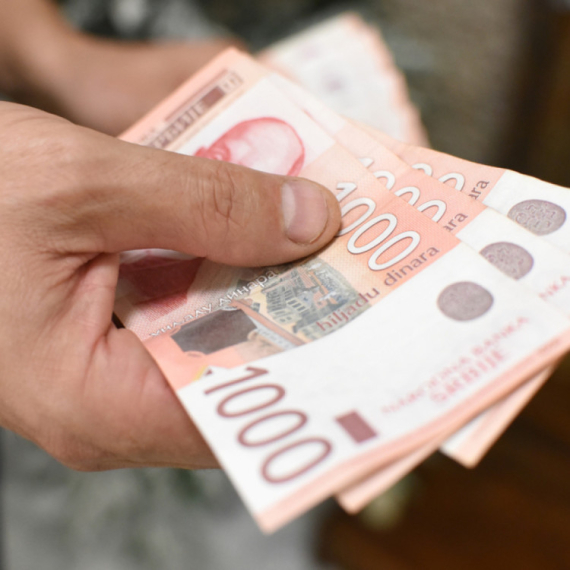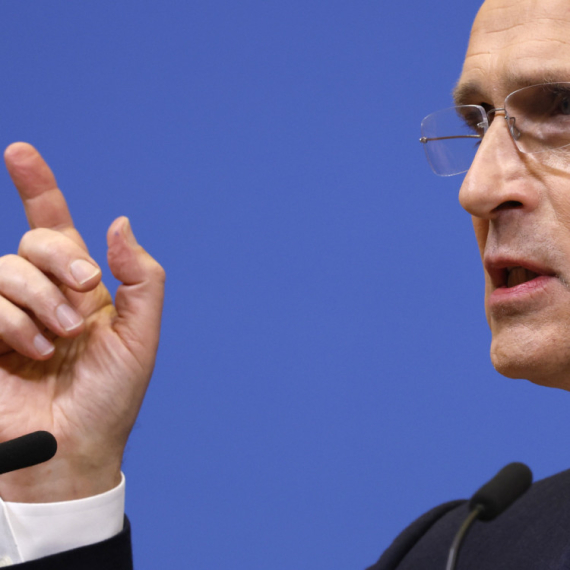U.S. embassy: Minister's claim is conspiracy theory
The U.S. embassy has described as "an unfounded conspiracy theory" the claim that Vojislav Šešelj was released by the U.S. to bring down the Serbian government.
Friday, 14.11.2014.
11:57

U.S. embassy: Minister's claim is conspiracy theory
"The Hague Tribunal is controlled by the United States, who, through the mouth of Vojislav Šešelj, are saying they will bring down the Serbian government," said the minister."There is absolutely no truth to that," the embassy said in a statement sent to the Belgrade-based daily Danas, and added that the Tribunal (ICTY) was set up under the auspices of the United Nations Security Council, while the trials taking place there are "protected from political influence."
"The United States supports the work of this court, but does not influence its decisions or opinions. Any other interpretations are untrue," the statement said.
The leading party of Serbia's ruling coalition, the SNS, was formed in 2008 by Tomislav Nikolić and Aleksandar Vučić after splitting from Šešelj's Radicals (SRS). As Šešelj returned to Serbia after spending nearly 12 years in detention, Nikolić was visiting the Hilandar monastery in Greece, while Vučić was touring a factory in the eastern town of Bor, saying only he wished Šešelj "good health."
It was Vulin, who was also in Bor, who addressed the development to say it was perhaps time to "think about" the priorities of Serbia's foreign policy. Vulin heads the Movement of Socialists - a minor party that was allied with the SNS ahead of the elections, and was previously a member of Mirjana Marković's JUL.
This was not the first time that Vulin made similar statements. He previously suggested that Šešelj's release would destabilize the government and that its purpose was to "discipline" Belgrade because of its relationship with Russia.
The Danas newspaper said it unofficially learned from the government that no decision or conclusion has been made that would support Vulin's statements, despite the fact he spoke in his role of cabinet minister. The daily said its sources noted that "U.S. Ambassador Michael Kirby, on the day of Albanian Prime Minister Edi Rama's visit, met with President Nikolić, and a week before also spoke with PM Vučić."
The daily said it received no answer from the government when asking why the minister of labor, rather than the country's foreign minister, was making comments about the United States.
Vulin was not answering his phone on Thursday, while FM Ivica Dačić, who was in Berlin, did not answer when asked what the Foreign Minister planned to do "if Vulin's words are Belgrade's official position."
The daily quoted "some of Vulin's colleagues" as saying his statements represented "a minister's political appraisal that should not be publicly commented on."
"Vulin is Vučić's voice from the belly when it comes to these topics. He would not speak about this unless he had Vučić's approval, or his order," said political analyst Đorđe Vukadinović, and added:
"Vučić speaks through Vulin when he wants to send a message to the public at home or to western ambassadors. This now is a message sent to both addresses, it is supposed to compromise Šešelj and compensate for the effects of his return."
According to Vukadinović, "the constant spinning of the domestic public about outside threats, while at the same time exchanging mutual praise with the West, is creating confusion, and in this constant game of masks the actors themselves are forgetting which one is their true face."
Vulin spoke again about Šešelj on Thursday when he told the public broadcaster RTS that he was "unfortunately right when he said Šešelj had come to destabilize Serbia."
"By that I certainly did not mean he would vote in parliament, because he cannot vote in parliament, or secure a majority to bring down the government. We expected insults and threats from him, but he today announced a great misfortune for Serbia when he said, 'I will not return to The Hague voluntarily'," Vulin said, and added that the country was "now at the mercy of the Hague."
If the tribunal orders his return, the minister stressed, "we will have to arrest him and apply our laws."
"The tribunal can cause clashes among Serbs whenever it wants. It would be enough to demand his arrest and transfer to The Hague. A number of hotheads can always gather and offer resistance to the police. What have we come to? After everything, after all these years, all the effort that Serbia becomes a normal country, we must think about this," said Vulin.
As for his advice to Vučić to reexamine the country's foreign policy priorities, he said that "diplomacy is a complex thing, but we must consider what we are doing."
"This is my personal position, I wished to tell the truth the way I see it. I have exposed myself to a lynch, I knew it would be that way. Now Vučić is under pressure because of me, but we'll talk about that as well," Vulin concluded.



































Komentari 8
Pogledaj komentare